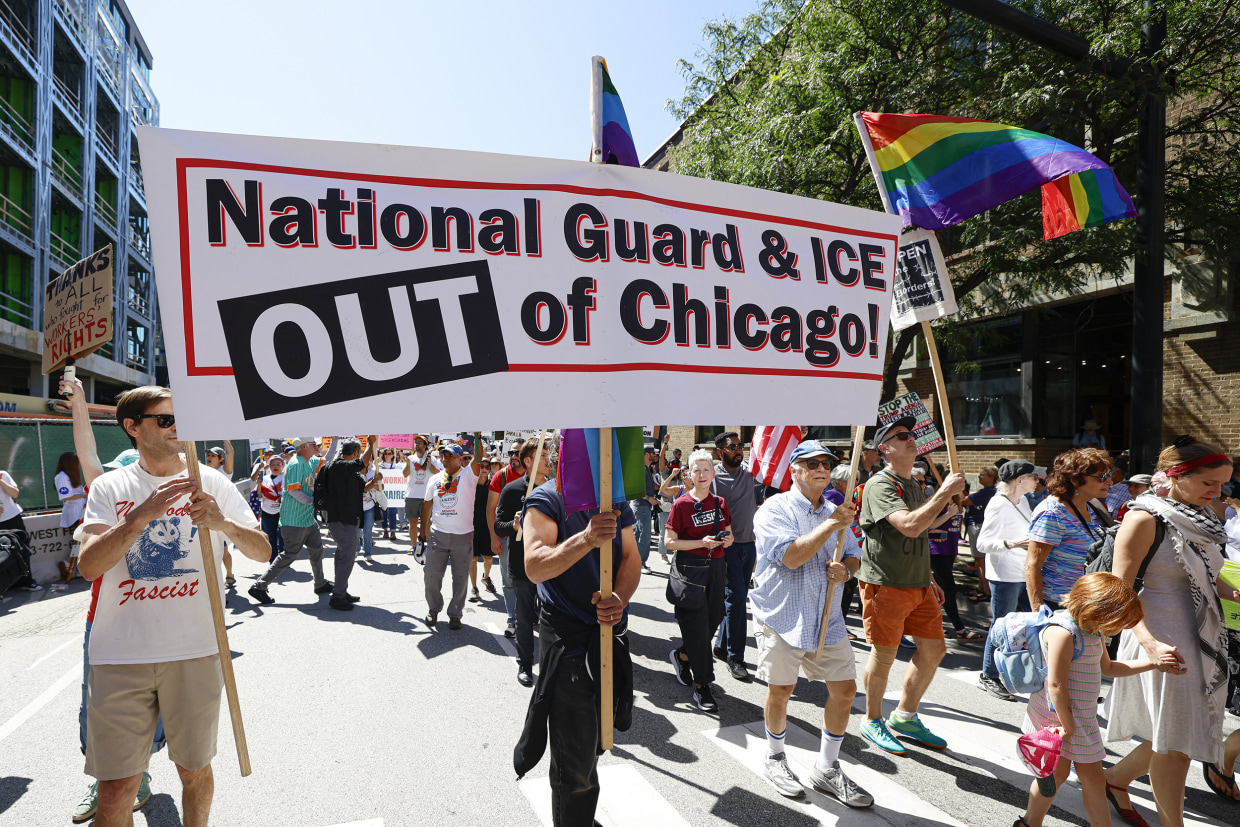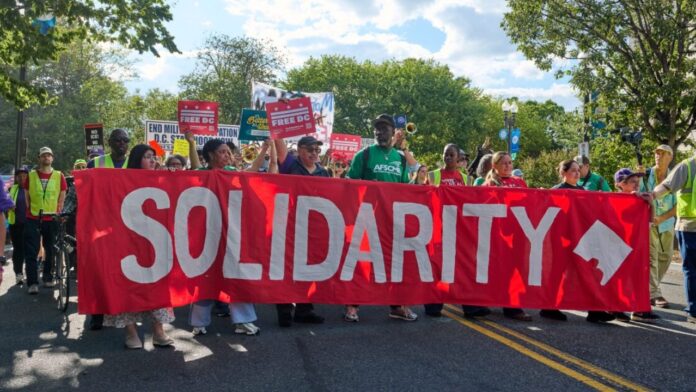One of the Largest Labor Day Demonstrations in Decades
Tens of thousands of protesters marched across the United States on Labor Day in a massive display of discontent with what organizers described as a “billionaire takeover” of government. The movement, branded as “Workers Over Billionaires,” mobilized demonstrators in all 50 states, marking one of the most widespread Labor Day protests in decades. More than 1,000 events were held, ranging from large gatherings in major cities to smaller rallies in rural, traditionally conservative areas.
The action was spearheaded by the AFL-CIO, in partnership with May Day Strong and a coalition of labor and grassroots groups including the National Education Association, Indivisible, and MoveOn. Organizers said the protests were designed to highlight working-class frustration with President Donald Trump’s policies, which they argue prioritize the wealthy elite over everyday Americans.
Saqib Bhatti, executive director of the Action Center on Race and the Economy, emphasized the breadth of the campaign, noting, “This was about showing that resistance to the billionaire agenda exists in every single community across this nation.”
Protests Confront Wealth in the Hamptons

In one of the weekend’s most high-profile actions, protesters disrupted Labor Day festivities in the Hamptons, a playground for the country’s ultra-wealthy. Demonstrators entered the American Hotel in Sag Harbor, confronting diners with chants denouncing lavish spending while accusing the rich of funding authoritarian policies.
“You’re sitting here enjoying $200 caviar as though your wealth isn’t enabling a fascist regime,” one activist shouted, in video footage shared by advocacy group Planet Over Profit.
The Hamptons protest also targeted the home of billionaire hedge fund manager Bill Ackman, part of what organizers called their new Department of Class Solidarity—a symbolic “national war room” documenting the names, industries, and influence of U.S. billionaires. This initiative, activists said, will tie specific fortunes to worsening poverty and inequality, echoing related campaigns such as Tesla Takedown Protests and Purge Palantir, which challenges government ties to surveillance technologies.
Cities Push Back Against Federal Intervention
Major urban centers saw some of the most spirited demonstrations. In Chicago, Mayor Brandon Johnson joined hundreds of marchers at the historic Haymarket Memorial, a symbolic site in U.S. labor history. Responding to Trump’s threats to deploy the National Guard, Johnson declared, “We’re going to defend democracy in Chicago. We’re going to protect the humanity of every single person in this city.”
The march wound its way past businesses linked to Trump-era policies, including Target and Tesla dealerships, with chants condemning the administration’s treatment of unions. Bob Reiter, president of the Chicago Federation of Labor, did not mince words: “Trump is a bad dude who never honored union agreements.”
In New York City, demonstrators rallied outside Trump Tower under the banner of a “National Workers Over Billionaires Day of Action.” The group One Fair Wage amplified calls for higher pay, while Refuse Fascism led a march from Columbus Circle, bringing together a wide coalition of workers, students, and activists.
Boston witnessed its first major Labor Day parade in decades, with Senator Elizabeth Warren and Governor Maura Healey marching alongside thousands of union members and workers. Their presence underscored the increasing alignment between progressive leaders and organized labor.
White House Defends Record
Amid growing criticism, the White House defended President Trump’s policies, insisting he has done more for workers than any administration in recent memory. Spokesperson Taylor Rogers stated, “No one has done more for working men and women than President Trump.” Press Secretary Karoline Leavitt added, “We finally have a president who fights and delivers for the American worker every single day.”
But protesters challenged that narrative, pointing to what they described as harmful policies. Among their grievances: the loss of collective bargaining rights for over 400,000 federal employees, the forced departure of 150,000 career civil servants, and efforts to cut Medicaid, Social Security, education, and healthcare funding. Demonstrators also highlighted what they saw as targeted attacks on immigrant and minority communities.
Growing Support for Unions
Despite political tensions, union approval ratings have surged to their highest levels since the 1960s. A recent Gallup poll showed that 68% of Americans support labor organizations, a striking indicator of shifting public sentiment.
Randi Weingarten, president of the American Federation of Teachers, addressed crowds with a message of solidarity: “This is about workers standing up, in every city and every town, to demand what we deserve.”
The scale of the protests suggests that organized labor, once perceived as waning, is regaining its influence as a driving force in American politics. With economic inequality dominating headlines and political campaigns, many analysts predict that the “Workers Over Billionaires” movement could set the tone for future labor battles.
A National Labor Movement Reignited
From small towns in the Midwest to coastal enclaves of the wealthy, the Workers Over Billionaires demonstrations showcased the deep frustration of working Americans. What began as a Labor Day protest is now being described by organizers as the rebirth of a national labor movement determined to challenge corporate and political power.
Whether the protests will lead to concrete policy changes remains to be seen. But for many on the streets this Labor Day, the message was clear: the battle lines between workers and billionaires have been drawn.
Sources: Reuters


